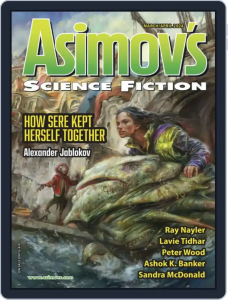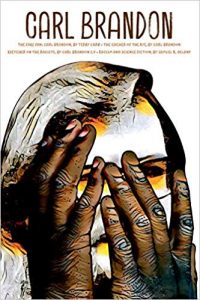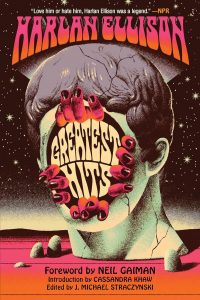A.C. Wise Reviews Short Fiction: Asimov’s
The March/April 2024 issue of Asimov’s is quite a strong one. It opens with a “How Sere Kept Herself Together” by Alexander Jablokov, the third in a series of stories featuring Sere, an investigator, who in this case starts off looking into a kidnapping, but finds herself embroiled in a far more complex case. The worldbuilding is nicely done and the novella does a good job examining toxic, codependent relationships through the lens of science fiction. “Sunset” by Lavie Tidhar is a quiet and melancholy piece about a Martian woman traveling to Earth to experience a sunset – something her deceased lover always wanted to do, but never got the chance.
“Turtles to the Sea” by Sandra McDonald tells the intertwined stories of a family across multiple time periods, focusing primarily on a time-traveler stranded in the past, and his adult daughter in the present day. The novelette is rooted in a deep sense of place, and McDonald does a wonderful job of giving the reader distinct characters who feel fully rounded, while also exploring themes of marine conservation, the nature of time, and complicated family relationships. “The Man in the Moon Is a Lady” by Ian Baaske makes effective use of a play-within-a-story to tell the tale of a lone female astronomer disbelieved by her male colleagues when she reports observing a warring lunar society on the moon. The structure of the novelette is reminiscent of The Spear Cuts Through Water by Simon Jimenez, while some of the imagery evokes George Méliès’s classic sci-fi film A Trip to the Moon. Baaske captures a distinctive voice for the story, and the final lines speak powerfully to the idea of being truly seen and recognized.
“The Last Cloud Painter” by Rajan Khanna is a novelette full of lush descriptions, which follows Oliver, a cloud painter, who is caught between pursuing his art and the pressure to settle down to a practical, but boring, life. When his hot air balloon is blown off course during a storm, he gains a new perspective on his life and the value of art. “Peck” by Dr. Bunny McFadden is a sweet and surprisingly emotional story about cyborg pigeons serving as companion animals for neurodivergent people. Joey inherited her father’s company and the technology behind the Pocket Model pigeons, but she’s being forced to decommission them. She comes up with a plan to retire the pigeons as humanely as possible, meanwhile the pigeons develop a plan of their own.
“Charon’s Final Passenger” by Ray Nayler is set in the same world as the author’s story “Berb by Berb”, published in the November/December 2023 issue of Asimov’s. Sylvia taps into the memories of the dead using technology while on the trail of a Russian spy, but begins to lose herself in those memories. The story thoughtfully examines the human cost of war, and Nayler effectively uses the alternate history subgenre to explore humanity’s tendency toward violence, showing a world where access to advanced alien technology did not usher in a new era of peace, but only gave humans different means of destroying each other. “The Inefficiency of Pangenetic Self-Replication as a Theory of Anthrobotic Evolution by Yantra Arora” by Ashok K. Banker is a fun story with a great voice that also explores weighty questions about the nature of existence. Yanta, a country-bot, travels to the great bot city to present his award-winning essay positing the existence of an organic creator who originated the bot creators who created all bot life. His views are labeled heretical, and his lifestyle choices are seen as deviant, putting him in danger of being decommissioned. However, he gains a following, his ideas spread, and Yantra manages to find allies in unexpected places.
“There’s Nothing in the Attic” by Faith Merino puts an SFnal spin on the Gothic trope of the “madwoman in the attic.” The wife, stepdaughter, and nanny of the story’s unnamed family believe their new home is haunted. When the father demands scientific proof, the women take a deep dive into various scientific theories, leaving the father feeling insecure, which causes his worst impulses to surface. Merino does a wonderful job of blending Gothic horror with science fiction, in a satisfying story that starts off with one flavor of creepiness and effectively circles around to another flavor entirely.
The issue concludes with the excellent novella, “Une Time Machine, S’il Vous Plaît” by Peter Wood. Coffee mogul and billionaire Adeline Deveraux builds a theoretical starship engine based on a paper written by a French Canadian physicist in the 1970s. She’s accompanied on the ship’s maiden voyage by her brother Pascal, and two actors, Ruth Mulu and Matt Wallace, stars of FTL, a Canadian sci-fi show that aired back in the 1970s. During the flight, the engine malfunctions, sending Pascal and Ruth back in time. They both set out on independent quests to change the future. Pascal tries to make it so that his mother leaves her company to him instead of Adeline, while after being fired from FTL for refusing Wallace’s advances, Ruth uses her knowledge of the future to win a longshot sports bet, becoming a millionaire, and buying out FTL’s production company. Adeline and Wallace eventually end up in the past as well, leading to a great deal of jockeying for position as they try to undo the changes Pascal and Ruth have made and restore things to the way they “should” be. It’s a highly satisfying time-travel story with a strong voice, and a very enjoyable read.
Recommended Stories
“Turtles to the Sea”, Sandra McDonald (Asimov’s 3-4/24)
“The Man in the Moon Is a Lady”, Ian Baaske (Asimov’s 3-4/24)
“Peck”, Dr. Bunny McFadden (Asimov’s 3-4/24)
“The Inefficiency of Pangenetic Self-Replication as a Theory of Anthrobotic Evolution by Yantra Arora”, Ashok K. Banker (Asimov’s 3-4/24)
“There’s Nothing in the Attic”, Faith Merino (Asimov’s 3-4/24)
“Une Time Machine, S’il Vous Plaît”, Peter Wood (Asimov’s 3-4/24)
This review and more like it in the May 2024 issue of Locus.
 While you are here, please take a moment to support Locus with a one-time or recurring donation. We rely on reader donations to keep the magazine and site going, and would like to keep the site paywall free, but WE NEED YOUR FINANCIAL SUPPORT to continue quality coverage of the science fiction and fantasy field.
While you are here, please take a moment to support Locus with a one-time or recurring donation. We rely on reader donations to keep the magazine and site going, and would like to keep the site paywall free, but WE NEED YOUR FINANCIAL SUPPORT to continue quality coverage of the science fiction and fantasy field.
©Locus Magazine. Copyrighted material may not be republished without permission of LSFF.








Thank you so much for your kind words about my novella.